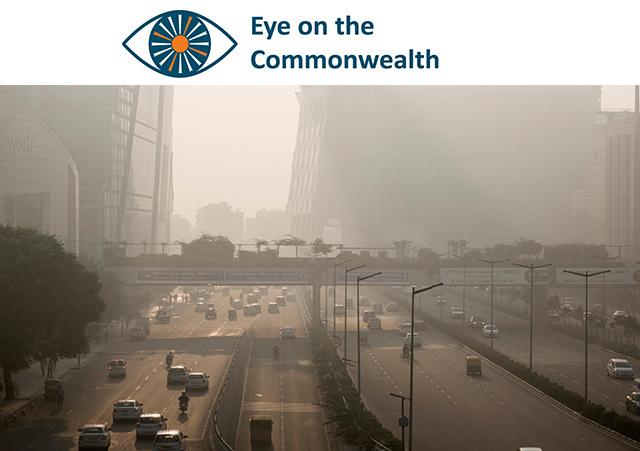 Traffic and pedestrians in hazardous levels of air pollution in Cyber City, Gurugram, India. [photo: Paul Kennedy / Alamy Stock Photo]
Traffic and pedestrians in hazardous levels of air pollution in Cyber City, Gurugram, India. [photo: Paul Kennedy / Alamy Stock Photo]
India officially overtook China as the world’s most populous country this week. After decades of being held up as the poor relation of the developing world’s emerging powers, India had a proud moment in the sun as economists compared its youthful population with China’s much older median age (28.7 v 38.4). But India’s ‘demographic dividend’ may be more fragile than predicted: life expectancy in India lags six years behind and may never overtake that of China.
Even in the rich EU, more than 300,000 people a year die prematurely from air pollution, according to the European Environment Agency. That is nearly half the excess deaths from Covid-19 during the first year of the pandemic. But India, with just three times the EU’s population, attributed a staggering 1.67m deaths to air pollution – nearly one in five deaths in 2019 – at a cost of $36.8bn, or 1.4% of GDP, the Global Burden of Disease study found.
Largest environmental health threat
IQAir’s annual report on air quality in 7,323 cities across 131 countries, was released this month – and it’s enough to make your eyes water. ‘Air pollution continues to be the world’s largest environmental health threat,’ it states, accounting for 93bn days of illness and more than 6bn deaths a year. It puts the cost at $8tn, or 6.1% of global GDP. With fewer clean options in the developing world, burning fossil fuels for transport and energy, as well as wildfires, impose the heaviest toll on the most vulnerable. ‘More than 90% of pollution-related deaths occur in low-income and middle-income countries,’ IQAir notes.
Research Article: Building more common wealth in a climate changed world
Research Article – The unfinished project of decolonisation: a revisionist reading of Pakistan at 75
The Challenge of the 21st Century: Setting the Real Bottom Line
Of the five worst cities, only one – Hotan in China – is not in the Commonwealth. The others were Peshawar and Lahore in Pakistan; Delhi and Bhiwadi, 80km from the capital, in India. All had PM2.5 concentration above 90 micrograms per cubic metre – nearly 20 times the World Health Organization’s guideline of 5μg/m3.
IQAir’s list of the 50 most-polluted cities from 2017 to 2022 reveals that only six were not Commonwealth ones – the other 44 were all in the Indian subcontinent. Apart from Lahore (in first place again), Peshawar, Faisalabad and Bahawalpur in Pakistan, and Bangladesh’s capital, Dhaka, the other 39 worst-polluted cities were all in India. And 26 of the next 50 cities were in India too.
African countries unaccounted for
If polluted air is a Commonwealth issue, it is one most members are only barely aware of – 35 African countries were unaccounted for in IQAir’s report as only 19 of the continent’s 54 states had sufficient data. Parts of the Commonwealth do have good air, even if they are mostly in the middle of the Pacific Ocean. But only three Commonwealth members out of 13 countries or territories worldwide met WHO guidelines last year: Australia, Grenada and New Zealand (Bermuda is one of the 13 but a British Overseas Territory).
Polluted air does not just shorten life expectancy. PM2.5 particulates enter the bloodstream and affect the central nervous system. They impair respiratory, cardiovascular and cognitive functions, affecting concentration and mental performance. A paper published this week by the eLife journal finds a strong link between pollution and cognition in the first year of life, when brain size doubles, after looking at air quality linked to cooking fuel in 215 homes in Shivgarh, a rural town in Uttar Pradesh, one of the most polluted Indian states. The study suggests reducing cooking emissions should be a key target.
‘Eye on the Commonwealth’ columns look at current issues facing the Commonwealth
Productivity also declines as pollution increases, with transport being the worst culprit. But while dirty air has long been known to affect manual labourers, a 2016 study found that air pollution also hit office workers’ productivity too, and suggested minimal cuts to air pollution could boost output by billions of dollars a year. Similar results were found in Indian factories.
The answer to this filthy problem, as always, is a joined-up strategy and a concerted effort by all. The Economist points out how Krakow, a city once known for air ‘so thick you could taste it’, was transformed after a domestic ban on burning wood and coal, plus subsidies for clean technology such as heat pumps. The air is now ‘clean enough to smell the stink of diesel cars’. The jump in energy prices that is squeezing family and national budgets worldwide should have at least one positive effect: accelerating moves to cheaper, cleaner alternatives, such as solar panels.
The Commonwealth Secretariat’s calls for a ‘blue economy’ appear to be focused solely on the oceans – it could do with some very practical ‘blue-sky thinking’. But ultimately, of course, the best way to clean our air is simple: reduce carbon emissions.
Oren Gruenbaum is a member of the Round Table editorial board
Find out more about the Commonwealth Round Table and the Round Table Journal



